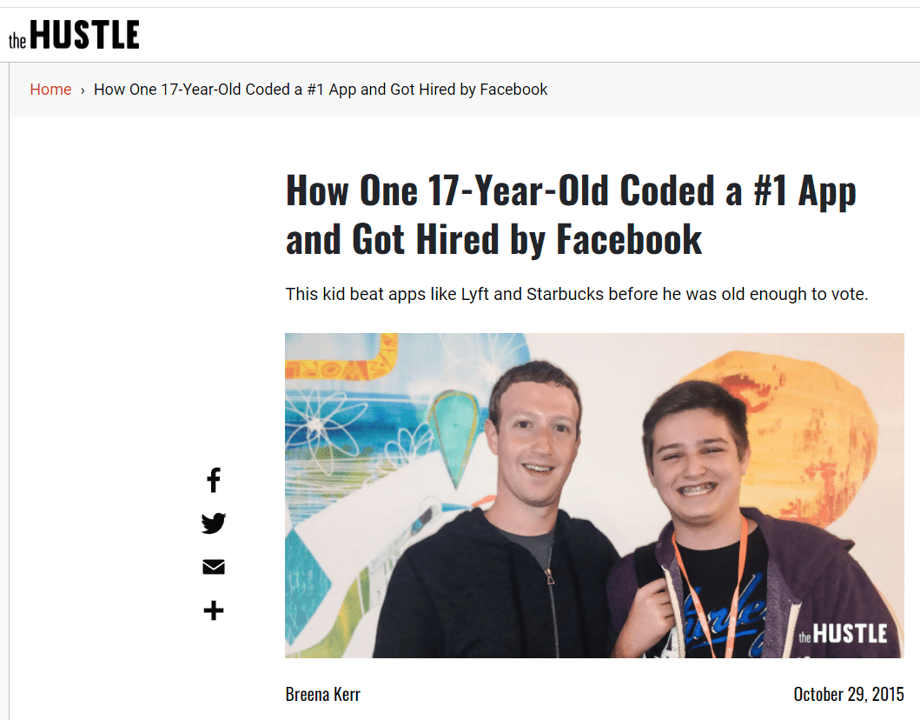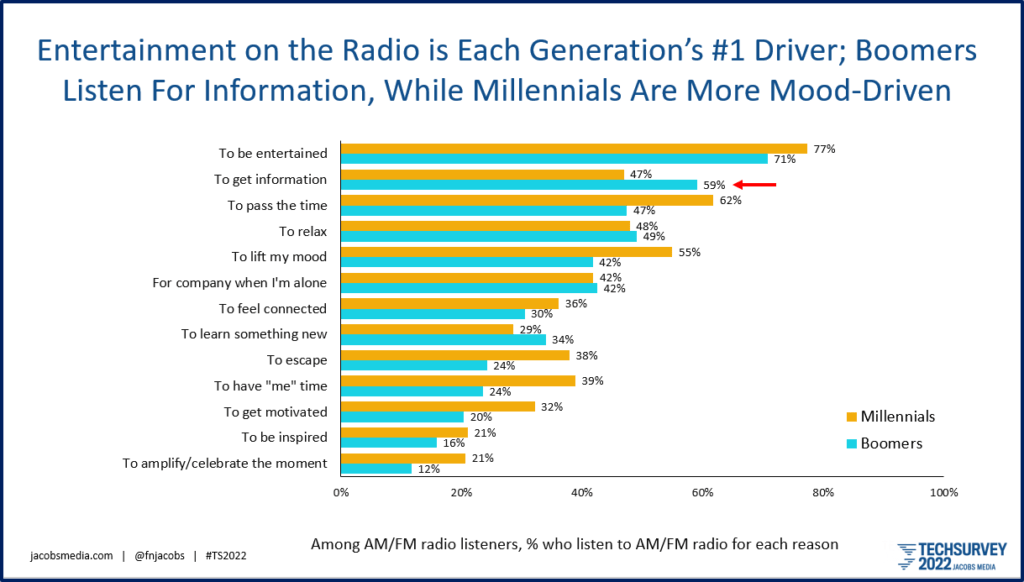Somehow, perhaps our best President nailed an important truth more than 150 years ago.
Lincoln had the right idea about facing up to our problems – those big, gnarly, existential problems that permeate our lives and our psyches. We inherently know that if we don’t look these issues right in the eye, we are doomed to disappointment.
There is no shortage of radio pundits who are sure they know what’s wrong with the industry. It’s a growing list that must keep the most responsible of CEOs and owners tossing and turning at night. Today’s post is not about the litany of challenges facing radio. As my friend, the NAB’s Sam Matheny, puts it, that’s like boiling the ocean.
So let’s eat that elephant one bite at a time. And if Honest Abe could peer down at us radio folks, he’d probably reckon that if we don’t address the industry’s gaping youth problem, we’re going to find ourselves in a heap of trouble down the road.
It’s a two-step process.
First, the industry needs to accept it has a youth problem, exacerbated by decades of neglect. Some might say the erosion of young generations was inevitable, given the exponential explosion of entertainment technology these last couple decades. While it’s true the inventions of the iPod, YouTube, and TikTok were all co-conspirators in radio’s under 40 audience declines, the smoking gun is the industry’s near-total decision to ignore this demographic, whether it’s research, formats, or personalities.
And second, it needs to once-and-for-all wake up and smell the strawberry-kiwi sangria. That is, younger generations operate on much different frequencies than their parents or even their older sibs. Understanding how they use your product or your service is a starting point.
That’s what Twitter’s chasing right now. They’re watching platforms like TikTok or Twitch steal their social thunder. As Mark Zuckerberg has realized, an aging Facebook is a bad long-term strategy. When teens want little to do with you, it amounts to a serious problem. At Twitter, they’re trying to figure out how to retrofit their community to better align with younger standards.
How are they accomplishing this Shrekian task? Not by hiring consultants who look like me. Instead, they have turned to a “Gen Z whisperer” – someone who understands the younger mindset because he’s young.
The expert in question is Michael Sayman, a now 22 year-old whiz kid hired by Zuckerberg when he dropped out of high school at the ripe young age of 17.
Back then, Sayman was a techie prodigy – a kid who understood technology, but also how his generation operates. Twitter is now writing a check to tap into his unique expertise.
Sayman was recently featured in a recent Washington Post story by Taylor Lorenz:
Sayman’s backstory is amazing. He and his family emigrated from Peru, and they struggled for years financially. During those salad years, Sayman moved to Google, worked on YouTube Shorts (a TikTok-like YouTube), Roblox, and finally Twitter.
Tech companies often use cool project names as code for their big initiatives. At Twitter, they’re working on “0-1,” a laboratory within the company conjuring up new features.
In Sayman’s mind, young people don’t look at technology and platforms the way grizzled web veterans do. As he told the Post:
“Twitter is a very different product for young adults, and most people are unaware of that,”
Lorenz’s story illustrates Sayman’s view of Twitter in numerous ways. I’ve been on Twitter since 2008, and you can classify me as an “aging Boomer.” I see the platform as a news and information site, allowing me to follow newsmakers, pundits, and other interesting people for news and views.
That’s not how Twitter youth uses the platform. Sayman says that while some tap into the news component, many young adults are more apt to access Twitter as a place to “express opinions or drive conversations on issues.”
Airbnb says it will temporarily house 20,000 Afghan refugees. Hope other major corporations will assist where possible too…https://t.co/tOtYonX0r1 via @businessinsider #leadership #help #brandactivism #entrepreneurialmindset
— Sarhola (@Sarhola) August 25, 2021
In the Post story, Gen Z users of Twitter comment on the slower speed at which things move. On the other hand, there’s less pressure on the platform to look and act “perfect,” an element all too common on Instagram, Snapchat, and of course, TikTok.
Sayman believes that Twitter might attract kids that may be shy or sensitive about their appearances. As he notes, “all they want to talk about (is) what’s going on in the world.”
Between COVID, Ukraine, climate change, and race relations, there’s no shortage of topics for young people to talk about on Twitter.

Ironically, Sayman’s vision for Twitter is a platform where personalities become more important, as well as developing “a place for you to share how you feel about things” – without being sliced and diced by an algorithm.
When I read the story about Sayman leading Twitter’s transition, I wonder if it might apply in some way to radio. Like Twitter, young people favor other platforms – notably Spotify and YouTube – rather than listen to radio.
But despite digital technology, many have favorite stations, personalities, or they enjoy winning contests. In our latest Techsurvey – fresh off the Excel presses – we had more than 30,000 total respondents of which 12% are Millennials. That means we have more than 3,600 of them to study.
So, the idea was to look at how they use radio versus Baby Boomers. And the question I chose was a new entry in Techsurvey, inspired by Jeff Vidler, the mastermind behind Signal Hill Insights out of Toronto.
We asked this question:
“Do you sometimes listen to AM/FM radio stations – on any device – for any of the following reasons?”
And we listed 13 motivations (along with “don’t listen for any of these reasons”). And here’s how it turned out.

For both Gen Y and those “OK Boomers,” it’s about entertainment – no surprise there.
But then you begin to see patterns like Michael Sayman has detected at Twitter. Boomers are especially apt to turn to radio for information (yes, just like Twitter). Millennials are more about mood elevation when it comes to their radio listening. They also profile considerably higher on escape, having “me” time, motivation, inspiration, amplification/celebration.
In much the same way Michael Sayman is reframing Twitter for young people, radio listening among Millennials takes on a much more visceral set of emotions. If you think about it, today’s twenty and thirtysomethings probably listen to the radio for the same emotional payout many of us derived from the medium when we were younger.
Now if you’re wondering why I didn’t compare Boomers to Gen Z, the answer is simple. While Baby Boomers are the most represented generation in Techsurvey – nearly a majority (49%) – Gen Z’s comprise a measly 1% of the sample. That’s around 300 respondents, more than enough for a perceptual study, but a paltry number for a huge national study of Americans and Canadians.
 And if you’re thinking that teens make up a much bigger portion of radio listeners in Nielsen, so what’s the problem with Techsurvey? Remember, our sample mostly comes from station email databases. Our data consistently shows most radio stations do very little to entice Gen Z listeners to join the club. When you don’t research a cohort, and you do remarkably little to encourage and reinforce them, you can’t expect compliance, much less loyalty.
And if you’re thinking that teens make up a much bigger portion of radio listeners in Nielsen, so what’s the problem with Techsurvey? Remember, our sample mostly comes from station email databases. Our data consistently shows most radio stations do very little to entice Gen Z listeners to join the club. When you don’t research a cohort, and you do remarkably little to encourage and reinforce them, you can’t expect compliance, much less loyalty.
Go back to those two action steps I laid out near the beginning of this post:
Admit there’s a Gen Z problem, and then lean into it and try to solve it.
It requires a commitment to change, a concerted effort to hire young people and put them in positions of power, and setting a priority on seeking out young expertise – like Michael Sayman – for guidance, and to develop strategies designed to address and right the problem. Twitter believes that in the social media vertical, it is in danger of aging out, being bypassed by TikTok and others platforms far more pleasing to today’s complex teenage mindset. They’re proactively trying to change it.
It turns out our 16th President also has words of wisdom for radio’s task at hand:
“The best way to predict your future is to create it.”
This is the first chart from Techsurvey 2022, and we’ll be sharing more of it in the coming days and weeks. To get a look at this data and what it means to radio broadcasters, join me at the AllAccess Audio Summit on Thursday, April 21st at noon ET. Register here.
- AI: Disrupting The Disruptors - January 31, 2025
- Appreciating What We Have (When Our Lives Aren’t In Jeopardy) - January 30, 2025
- AI: Oh, The Humanity! - January 29, 2025




Excellent blog and strong analysis of where we are today. Thank YOU!
From you, my friend, high praise. Thanks for reading it and for all you do for the radio industry.
Excellent. Nothing else to say. 🙂
Appreciated, Brad.
FASCINATING, FRED.
Perhaps radio can hire social influencers to join morning shows, or create daily features?
After being on Tik Tok for a year or so, Ive noticed there’s even LOCAL influencers with thousands of followers that could translate to local listeners.
Just a thought.
Love this. Find the youth who already have large followings locally and give them a mic–locally. And see what happens. Whatever that is, it can’t be worse than what’s happening now.
And as I hope you’ll agree when you read today’s post (3/16), I’m of the mind that if they’re doing it in college, they deserve a shot up here in the “pros.” Thanks for the note.
JC, man have done a great of amassing large audiences – better yet, communities, without having to crack a mic. There’s a lot to be learned from these young whippersnappers.
Jc is one of those people in the industry who is looking for solutions and progress. Oh how I wish the business could clone him. I stopped referring interns to some of the corporate groups in 2006 because they simply wanted free labor and envelope stuffers. It starts with positive word of mouth. Young people love to communicate and have the means now to make a small idea enormous. They can bring back the platform, but only after the ownership old guard is replaced.
Another great one Fred. Keep em coming.
Will do my best, Kevin. Thanks for the kind comment.
Fred, this is a great read. The best part was the fact that the industry totally neglected the youth. “the smoking gun is the industry’s near-total decision to ignore this demographic, whether it’s research, formats, or personalities.”
Sharing this now. #ilovethegame
Thank you, Dave. There’s still time (I hope). I appreciate your comment.
Spot on. However, when I read your header I honestly expected to read an ethical view on Ukraine. That line is going to resonate in my head alongside “All it takes for evil to triumph is for good men to do nothing.”
Peggy, good to hear from you, and thanks for the comment. And sorry I threw you off there with the Lincoln quote. These are strange days indeed.
I think we’re okay (no I don’t). I just went to a large company’s website to see the “playlist” and 12 of the items listed were COMMERCIALS they played in one set. One after another. But that’s not important right now. YOUR entertainment might not be MY entertainment. The success mass media enjoyed was based common likes. It’s been shattered these days but smart(er) folks can still determine what works and what doesn’t for boomers and zoomers and x’ers and – ya know. The barrier for us seasoned radio people used to be finding a station that had a need we could fill. In 2022 you just need a computer and a microphone and-you’ve got a podcast. If my entertainment is yours–we have a fit. If I do stuff that drives you elsewhere, well it’s a failure. I don’t believe entertainment’s definition has changed, it’s just a whole lot more difficult to find common ground. It goes without saying (but I’ll say it anyway) we NEED people like you, Fred to keep our heads on straight.
You’ve got to tell me (offline, if you prefer) just who that station is that’s listing their commercials, along with whatever music they’re still playing. And Dave, I very much appreciate your comment.
Thank you Fred…..the article was so nice I read it twice! I agree with the comment that radio companies should have a social media manager assisting talent/shows. Just as important if not more than a PD. Yesterday I asked a very popular morning radio program in Las Vegas (already on Twitch) for a message to others about social media. The reply was, “…..If you are not a radio show embracing Twitch in 2022, you are already behind…..”. Powerful – and says a lot. I am a big fan of Twitch and the platform fits perfectly with the community, interaction and popularity of what radio has built – it’s an easy next step that MORE radio companies should jump at……and soon.
Thanks for the kind words, Don. You are most definitely on the right road.